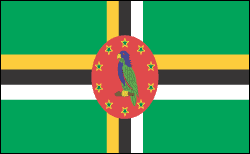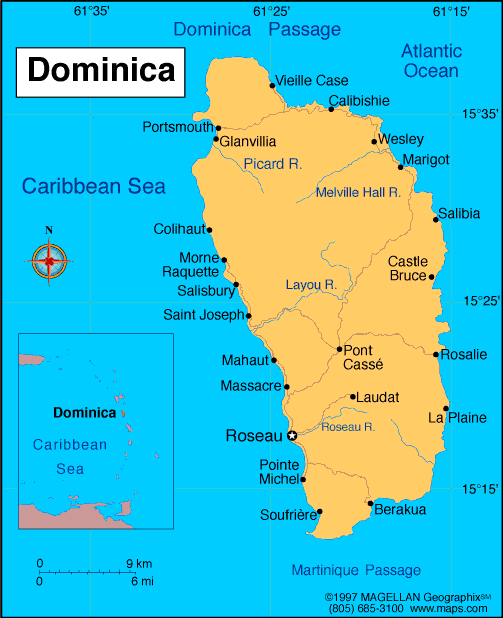DOMINICA

Geography: Dominica (pronounced Dom-in-EEK-a) is a mountainous island of volcanic origin of the Lesser Antilles in the Caribbean, south of Guadeloupe and north of Martinique.
Government: Parliamentary democracy.
History: Explored by Columbus in 1493, Dominica was claimed by Britain and France until 1763, when it was formally ceded to Britain. Along with other Windward Isles, it became a self-governing member of the West Indies Associated States in free association with Britain in 1967.
Dissatisfaction with the slow pace of reconstruction after Hurricane David devastated the island in Sept. 1979 brought a landslide victory to Mary Eugenia Charles of the Freedom Party in July 1980. The Freedom Party won again in 1985 and 1990. The opposition United Workers' Party won in June 1995. In 1997, Dominica became the first Caribbean country to participate in the work of Green Globe, aiming to make Dominica a model ecotourism destination. Although the island is poorer than some of its Caribbean neighbors, Dominica has a relatively low crime rate and does not have the extremes of wealth and poverty evident on other islands. Economic austerity measures, including higher taxes, were introduced in 2002. Massive protests followed.
In parliamentary elections in 2005, Prime Minister Roosevelt Skerrit's Dominica Labour Party won 12 of 21 seats.
Government: Parliamentary democracy.
History: Explored by Columbus in 1493, Dominica was claimed by Britain and France until 1763, when it was formally ceded to Britain. Along with other Windward Isles, it became a self-governing member of the West Indies Associated States in free association with Britain in 1967.
Dissatisfaction with the slow pace of reconstruction after Hurricane David devastated the island in Sept. 1979 brought a landslide victory to Mary Eugenia Charles of the Freedom Party in July 1980. The Freedom Party won again in 1985 and 1990. The opposition United Workers' Party won in June 1995. In 1997, Dominica became the first Caribbean country to participate in the work of Green Globe, aiming to make Dominica a model ecotourism destination. Although the island is poorer than some of its Caribbean neighbors, Dominica has a relatively low crime rate and does not have the extremes of wealth and poverty evident on other islands. Economic austerity measures, including higher taxes, were introduced in 2002. Massive protests followed.
In parliamentary elections in 2005, Prime Minister Roosevelt Skerrit's Dominica Labour Party won 12 of 21 seats.

Map of Dominica
Commonwealth of Dominica
President: Charles Savarin (2013)
Prime Minister: Roosevelt Skerrit
(2004)
Total area: 290 sq mi (751 sq km)
Population (2014 est.): 73,449 (growth
rate: 0.22%); birth rate: 15.53.; infant mortality rate:
11.61/1000; life expectancy: 76.59
Capital and largest city (2011 est.):
Roseau, 14,000
Monetary unit: East Caribbean
dollar
Languages:
English (official) and French patois
Ethnicity/race:
black 86.8%, mixed 8.9%, Carib Amerindian 2.9%, white 0.8%, other 0.7% (2001 census)
National Holiday:
Independence Day, November 3
Religions:
Roman Catholic 61.4%, Protestant 20.6% (Seventh-Day
Adventist 6%, Pentecostal 5.6%, Baptist 4.1%, Methodist 3.7%, Church of
God 1.2%), Jehovah's Witnesses 1.2%, other Christian 7.7%, Rastafarian
1.3%, other or unspecified 1.6%, none 6.1% (2001 census)
Literacy rate: 94% (2011 est.)
Economic summary: GDP/PPP (2013
est.): $1.015 billion; per capita $14,300. Real growth rate:
1.1%. Inflation: 1.8% (2013 est.). Unemployment: 23% (2000 est.). Arable land: 7%.
Labor force: 25,000 (2000 est); agriculture 40%, industry and
commerce 32%, services 28%. Agriculture: bananas, citrus,
mangoes, root crops, coconuts, cocoa; forest and fishery potential
not exploited. Industries: soap, coconut oil, tourism, copra,
furniture, cement blocks, shoes. Natural resources: timber,
hydropower, arable land. Exports: $40.4 million (2013
est.): bananas, soap, bay oil, vegetables, grapefruit, oranges.
Imports: $219.6 million (2013 est.): manufactured goods,
machinery and equipment, food, chemicals. Major trading
partners: Jamaica, Antigua and Barbuda, Guyana, Japan,
Trinidad and Tobago, U.S., China, Guyana (2012).
Member of Commonwealth of Nations
Communications: Telephones: main lines
in use: 14,600 (2012); mobile cellular: 109,300 (2012). Broadcast media:
no terrestrial TV service available; subscription cable TV provider
offers some locally produced programming plus channels from the US,
Latin America, and the Caribbean; state-operated radio broadcasts on 6
stations; privately owned radio broadcasts on about 15 stations (2007). Internet
hosts: 723 (2012). Internet users: 28,000 (2009).
Transportation: Railways: 0 km.
Roadways: total: 1.512 km; paved: 762 km; unpaved: 750 km (2010
est.). Ports and harbors: Portsmouth, Roseau.
Airports: 2 (2013 est.).
International disputes:
Dominica is the only Caribbean state to challenge Venezuela's
sovereignty claim over Aves Island and joins the other island nations in
challenging whether the feature sustains human habitation, a criterion
under the UN Convention on the Law of the Sea (UNCLOS), which permits
Venezuela to extend its Exclusive Economic Zone (EEZ) and continental
shelf claims over a large portion of the eastern Caribbean Sea.
-------------------- o --------------------
No comments:
Post a Comment